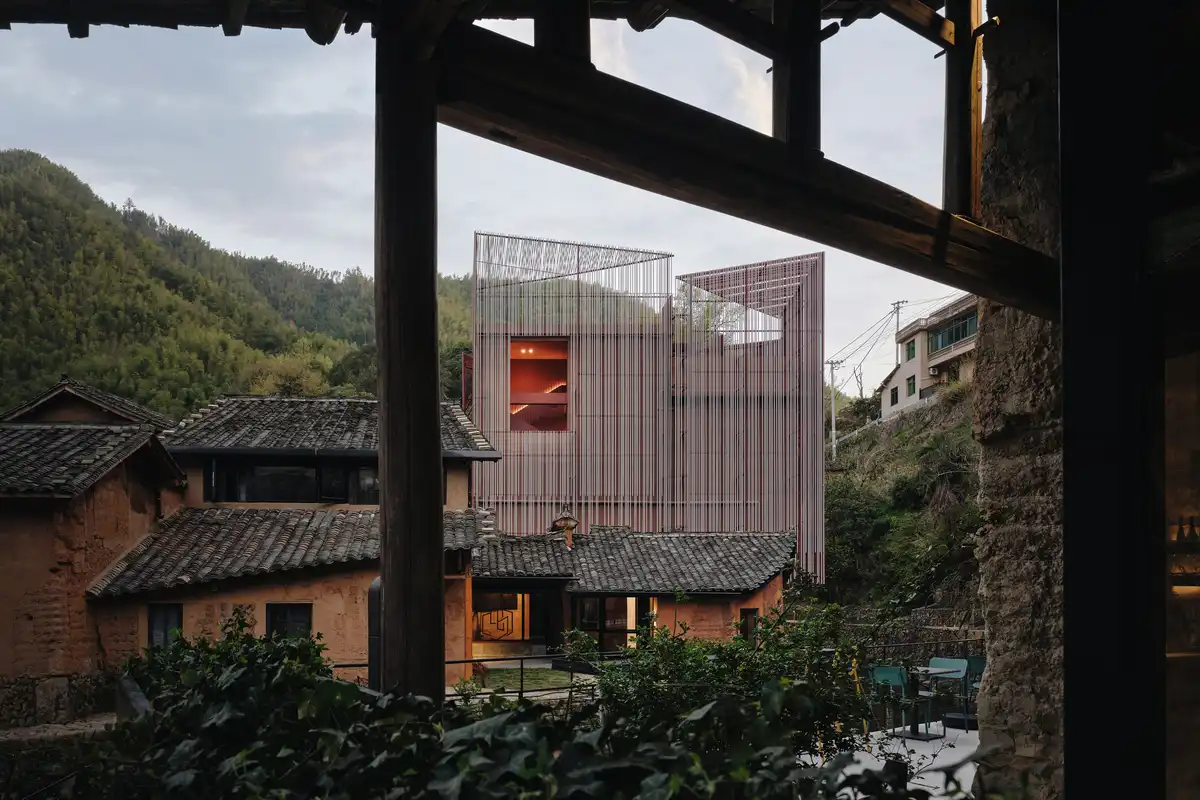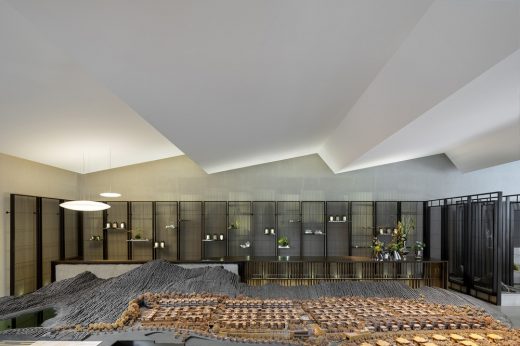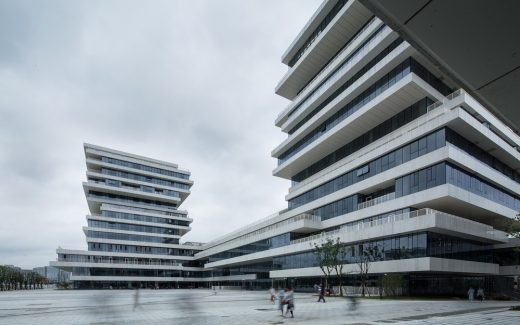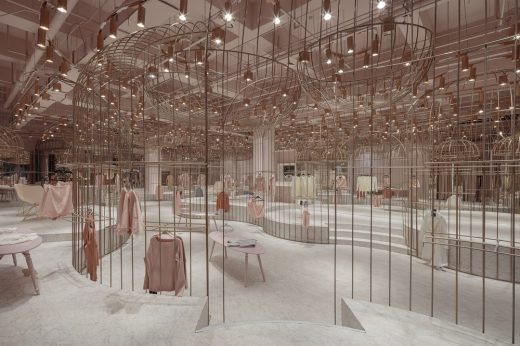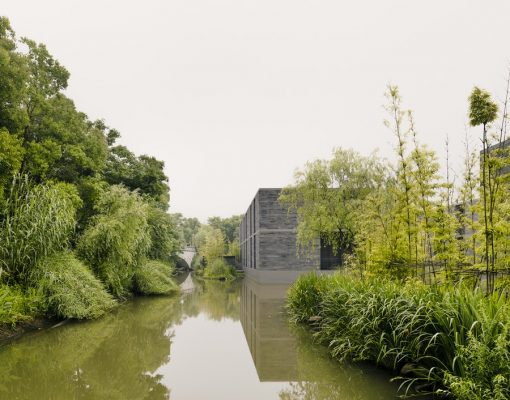The Songzhuang Z Museum quartet, development of the province of Zhejiang, Chinese architectural pictures
May 20, 2025
Architecture design: Team BLDG
Location: Huzhou city, province of Zhejiang, China
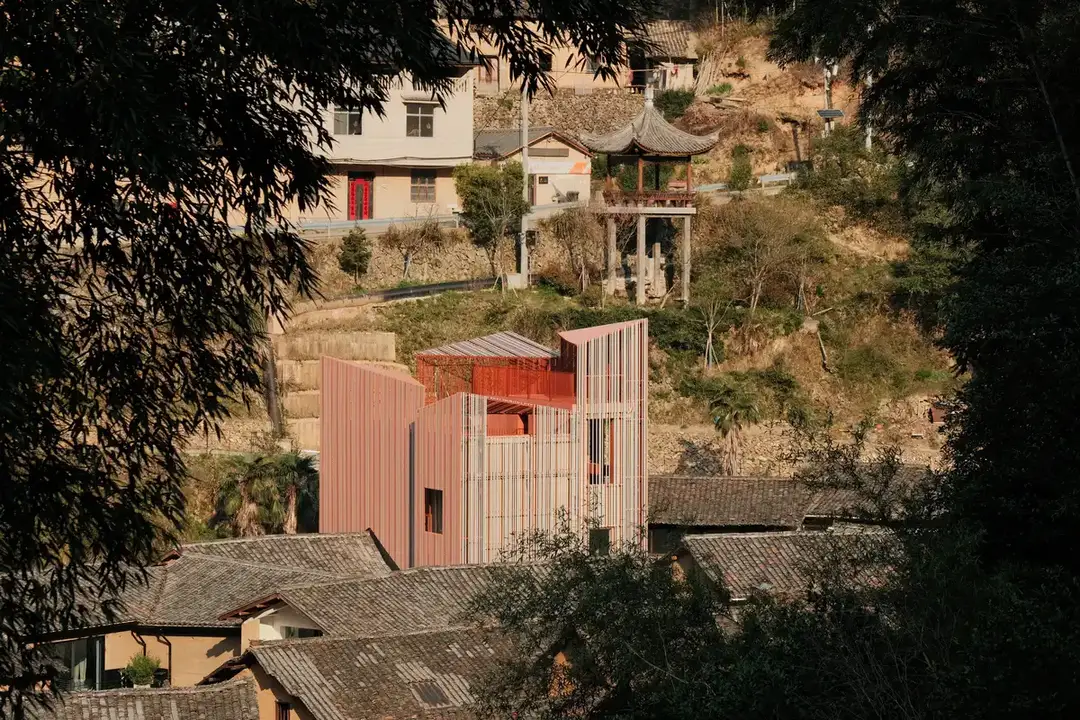
Photos: Jonathan Leijonhufvud
The Songzhuang Z Museum quartet, China
The Z Museum in the village of Songzhuang, the province of Zhejiang in the province of Zhejiang, is located over 400 meters above sea level, embedded deep in the mountains. With its winding streets and narrow paths, the first time feels as if you are entering a modern version of the “peach blossom spring”.
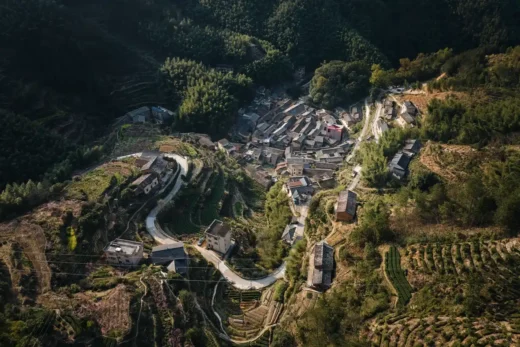
It is said that this was a place before 2017 where even most of Songyang had never visited – or even heard of it. As a result, the village has managed to preserve a large part of its original character, including its traditional living space and its historical spatial material.

At the beginning of 2024, Team_BLDG was invited to take over a project in this 600-year-old village: a inpatient house that was built in the nineties in the Z-Museum-das first contemporary rural art museum in China, which is dedicated to the topic of web.
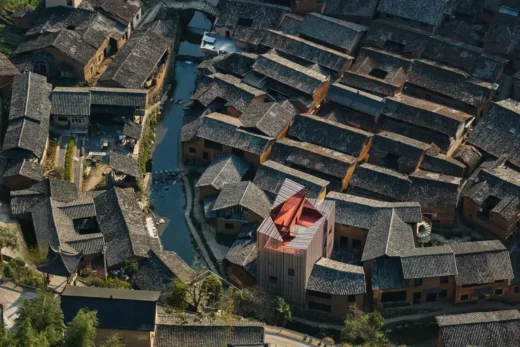
Better noticed than to disappear
The original architecture stands in a prominent location within the village of their scale and material contrast to the surrounding low, continuous rows of traditional rammingodes. After the building had been uninhabited for a long time, it had been considered renovated several times. It was only when the current operator, mountain creations, to transform it into the Z Museum did it take a clear vision.
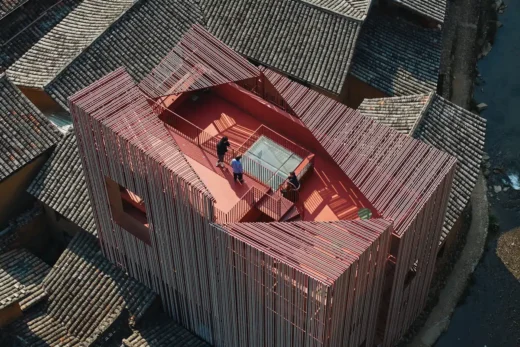
From the beginning, the operator sent Team_BLDG a final design direction: since the incongruity of the building with the village context was an established fact instead of hiding or reducing it, why not reinforced an unforgettable way? At the same time, this contrast should be appropriate and graceful – both with the spirit of an art museum and the character of the village itself.
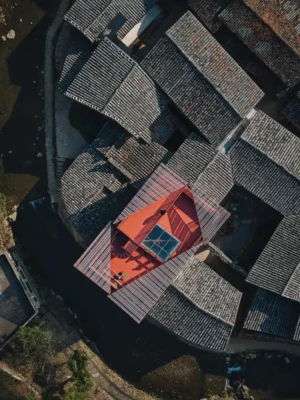
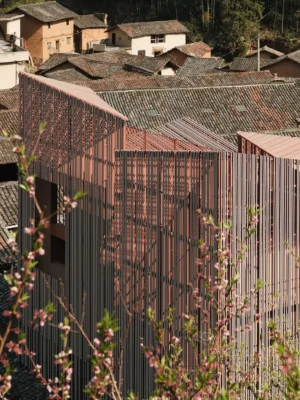
A quartet and a color -delayed skin
In view of the dense and rigid facade of the original structure, the design began with a deconstructive approach. The building was based on the scale and the spatial rhythm of the surrounding old houses and was divided vertically into four volumes from the inside out, whereby the courtyards were inserted in between. These four volumes were then combined vertically and horizontally. Different terraces were introduced on the roof and semi-transparent shading, which creates a dynamic composition of staggered heights what the architects described as the “quartet” of shapes.
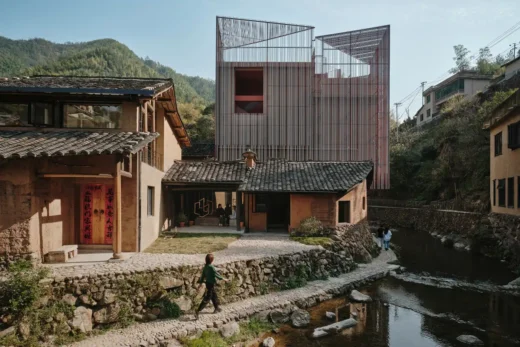
In order to visually “brighten” the mass of the original building, the architects were inspired by the traditional textile weaving. Aluminum quadrat tubes with 20 mm x 40 mm were painted red on three sides and on one white and then arranged in a fine grille that envelops the entire facade. Structural elements that are attached to the facade act like the shuttles of a loom that the interplay of “warp” and “shot” and weaving of strands with double “yarn” in the skin of the building. The result is a mass that feels both sensitive and diaphragm.
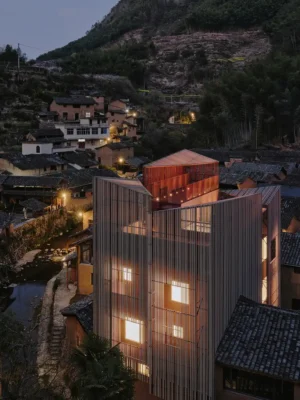
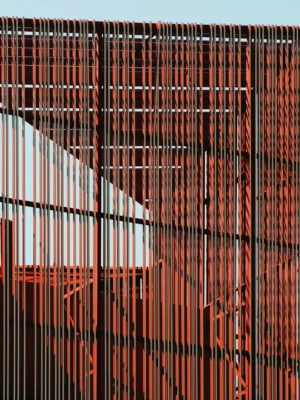
The design team concerns that the aluminum grille appears too rational and mechanical, and refined the arrangement by varied the distance of the slats. The gaps between the tubes are intentionally irregular, and the upper and lower sections are treated differently – open with denser patterns at the top and below. In particular, the grille introduces multi -dimensional interweaving on the terrace level and further increases the feeling of “woven skin”.
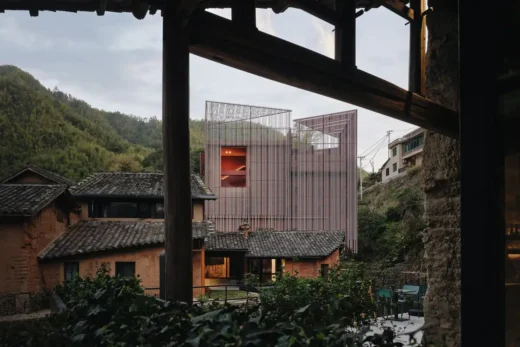
In the early morning, when sunlight filters into the mountain village, light and shadow begin to “weave” over the facade. Thanks to the red and white aluminum slats, the building takes on subtle and constantly changing colors all day. This means that every visit to the Z Museum gives a pronounced impression: on bright, sunny afternoons it can appear as a translucent pink volume; On rainy or snow -covered days it becomes a quiet, white monolith.
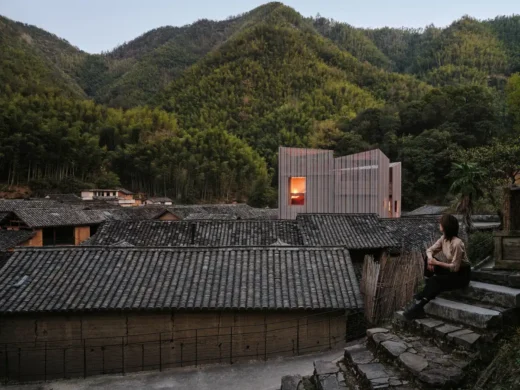
Rise to climb a light clamp
In order to give the works of art the complete focus, the architects deliberately minimized additive interventions for the interior and instead prioritize the clarity of circulation and the relationship between indoor and outdoor spaces.
The journey begins in the adjacent structure of the ramminger, in which a “prologue hall” has been inserted-a calm, weakly lit room. Apart from the red -painted steel cladding, which is added to the window frame and a traditional “tiger window”, the room largely stops the original appearance of the old house. Due to the consideration of this steamed spatial atmosphere with the contemporary interior of the main building, visitors will go through a sensory transition before entering the main exhibition areas.
A new skylight was introduced by cutting out a vertical atrium – a “light well” – which includes all three levels of the main structure. This shaft enables natural light and surrounding heat to penetrate deep into the interior, and also combines the horizontal spaces on every floor visually and physically. The exhibition halls at each level are arranged in this central emptiness, so that visitors can see others that move through the museum from different viewpoints.
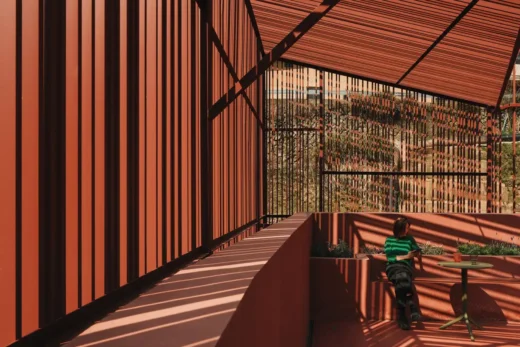
The original window openings were reconfigured in response to the surrounding landscape. This strategy of the “secondary framework” enables curated views of the village with the exhibited works of art and bridge the in -house museum with the rural context subtly. In the meantime, large new openings were carved into the outer wall of the staircase, which turned the third floor into a half-outdoor space and visually and experimentally strengthened the museum's relationship with the museum.
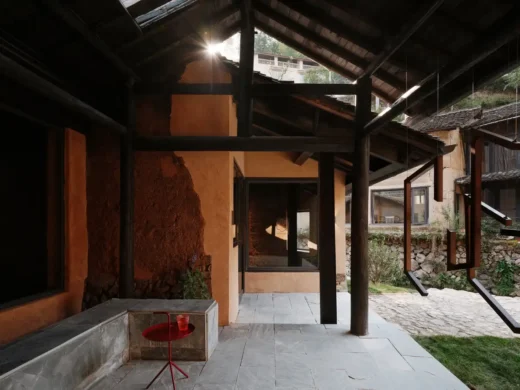
After reaching the terrace on the roof, visitors are offered a unhindered panoramic view of the village of Songzhuang. The uniform wall and earth materials as well as the lack of deliberate functional zoning only minimally lead the behavior of people through different increases, so that visitors can experience nature and relaxation completely.
In particular, the architects also designed a custom “Loom” venue series for the museum's café and shop, which were inspired by the forms of traditional looms. Each piece is built as a frame with 20 × 20 mm square steel tubes and is packed with 20 mm wide, custom red girts to create both horizontal and angled surfaces. The distance of these woven elements reflects the facade's grid system and expands the woven “thread” motif from the outside to the interior.
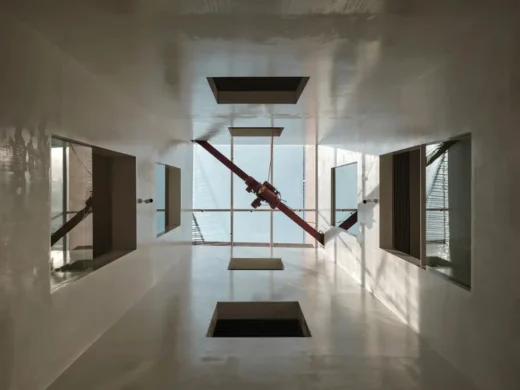
The Songzhuang Z Museum quartet in the province of Zhejiang, China – building information
Project name: The Quartet – Songzhuang Z Museum
Function: Museum , Cafe , Business
Draft time: 2024.02 – 2024.07
Construction time: 2024.08 – 2025.04
Location: Songyang, Zhejiang
Building area: 472 m²
Operator: mountain creations
Curatorial team: CSC Communis
Company: Team_BLDG
Architects: Xiao Lei, Deng Caiyi, Shen Ruijie
Structural design: Gonghe Architecture Design Group Co., Ltd.
Used furniture 、 lighting design: Team_BLDG
VI Design: Team_BLDG
Cooperation: N/A
Type: architecture, interior and landscape
Status: completed
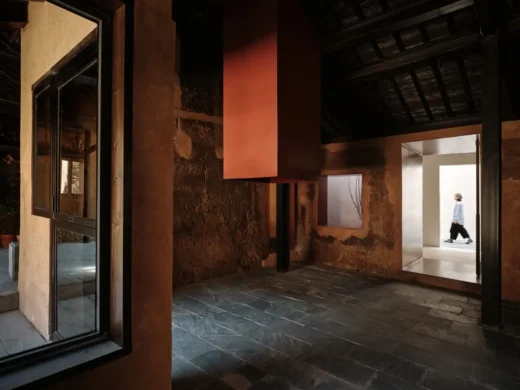
Photos: Jonathan Leijonhufvud
Photography Assistant: Wai Wai
The Songzhuang Z Museum quartet, the province of Zhejiang, China Pictures / Information received 200525
Location: Province of Zhejiang, China
Hangzhou building
Hangzhou building
The youngest Hangzhou building designs
Junxi Mountain Villa Sales CenterVanke Junxi, District Yuhang, Hangzhou City, Province of Zhejiang, China
Architects: More Design Office (MDO)
Photo: Sicong Sui, Duch Donts
Junxi Mountain Villa Sales Center in Hangzhou City
Integrated campus complex for Hangzhou Normal University
Design: WSP architects
Photo: Ruijing Photography/Zhang Hui
Integrated campus complex for Hangzhou Normal University
Jooos blade cabinXingguang Avenue
Architects: X+Living
Photography: Shao Feng
Jooo's changing room Hangzhou
Xixi Wetland Estate in Hangzhou
Design: David Chipperfield Architects
Photo: Simon Sreat
Xixi Wetland Estate in Hangzhou
Zhejiang World Trade Center Hangzhou
Jingshan Boutique Hotel Hangzhou Building
Ripple Hotel Hangzhou building
Architecture in China
China Architecture Designs – Chronological List
Chinese architect – Design office entries
Website: Hangzhou
Chinese architecture
Comments / photos for the The Songzhuang Z Museum, province of Zhejiang, China Designed by Team BLDG Page Welcome
